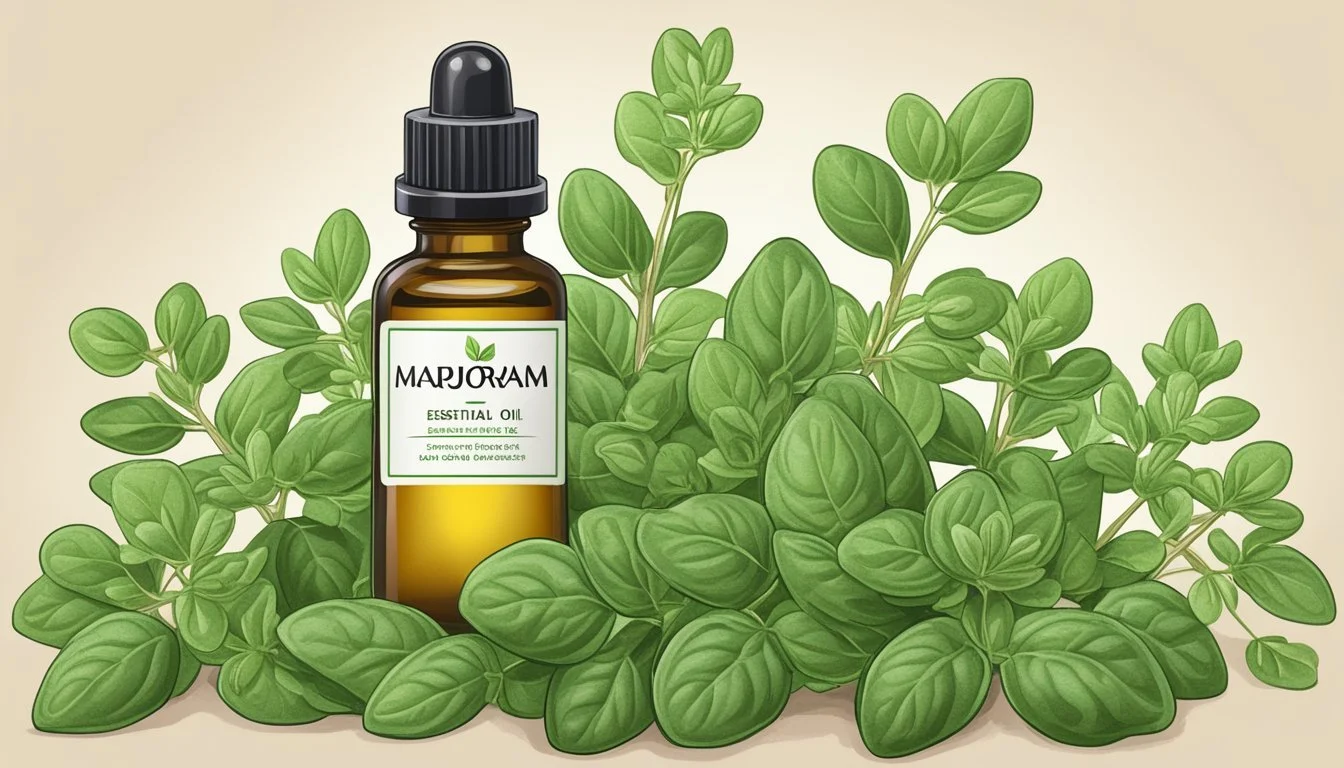What Are the Health Benefits of Marjoram?
Unveiling Its Herbal Perks
Marjoram, known scientifically as Origanum majorana, is an aromatic herb from the mint family and a staple in Mediterranean cuisine. This delicate green plant infuses dishes with a sweet pine and citrus flavor that complements a variety of ingredients. Beyond its culinary use, marjoram has a rich history in traditional medicine and is recognized for its potential health benefits.
The therapeutic properties of marjoram are extensive. Research suggests that its active compounds may help to reduce inflammation and promote better digestive health. Aromatic marjoram oil is often used in aromatherapy and has been associated with increased calmness and reduced stress levels. The plant is also considered to support cardiovascular health by contributing to the maintenance of healthy blood pressure levels.
In the realm of traditional uses, the healing virtues of marjoram have been employed to treat various ailments, ranging from simple digestive issues to complex cardiovascular concerns. Its inclusion as a spice in everyday cooking not only adds depth to the flavor profile of a meal but also offers a subtle way to imbibe the health benefits associated with this versatile herb.
Nutritional Profile and Properties of Marjoram
Marjoram, a fragrant herb in the mint family, possesses a rich nutritional profile known for its significant vitamin and mineral content, which contributes to its range of health benefits.
Vitamin and Mineral Content
Marjoram is particularly noted for its vitamin A and vitamin K content. These vitamins are crucial for maintaining good vision, skin health, and enhancing the immune system, as well as playing a vital role in bone health and blood clotting. Additionally, this herb contains a good blend of essential minerals, such as calcium, iron, magnesium, and potassium. Calcium is essential for bone health and muscular functions, iron is fundamental for blood production, magnesium supports over 300 biochemical reactions in the body, and potassium is key to cardiovascular health and nerve function.
Vitamin A: Important for vision and immune function.
Vitamin K: Crucial for blood clotting and bone metabolism.
Calcium: Necessary for bones and teeth.
Iron: Essential for blood cells and energy.
Magnesium: Aids enzyme function and energy production.
Potassium: Regulates fluid balance and blood pressure.
With these nutrients, marjoram offers high antioxidant properties, vital for combating oxidative stress and supporting overall health. The herbs' essential oils are also rich in antioxidants, contributing to its health-promoting attributes. Moreover, marjoram provides a small quantity of protein and fiber, further enhancing its nutritional value. Its inclusion in diet affords a host of benefits from its concentration of folate, which is important for DNA synthesis and repair, as well as preventing neural tube defects during pregnancy.
Health Benefits of Marjoram
Marjoram is a culinary and medicinal herb known for its aromatic qualities and health-promoting properties. The benefits of marjoram touch upon several aspects of health, from cardiovascular support to anti
Culinary Uses and Other Applications
Marjoram is a versatile herb esteemed for its aromatic leaves in various culinary creations and therapeutic applications. Its sweet, citrus-pine flavor profile makes it a valuable addition to many dishes and products.
In the Kitchen
Marjoram, often recognized for its culinary uses, is a staple in the kitchen, where it imparts a unique taste to a variety of recipes. It is integral in flavoring soups, stews, and marinades. The dried leaves of marjoram are commonly used as a seasoning, contributing their warm, woodsy flavor. Sweet marjoram is particularly popular in European cuisine and is frequently combined with other herbs in a bouquet garni.
Use in salads: Fresh marjoram leaves add a subtle hint of sweetness.
As a garnish: Sprinkle atop dishes for an aromatic touch.
In tea: Marjoram leaves can be steeped to create a soothing herbal tea.
For those looking to incorporate marjoram into their meals, consider the following:
Application: Marinades, Suggestion: Blend with olive oil and garlic for meat marinade
Application: Soups & Stews, Suggestion: Add during cooking for deep flavor infusion
Application: Salads, Suggestion: Mix fresh leaves with other greens
Application: Tea, Suggestion: Steep dried leaves in hot water
Aromatherapy and Topical Uses
Marjoram's benefits extend beyond the kitchen. Marjoram essential oil is widely appreciated in aromatherapy for its ability to calm the mind and promote relaxation. The scent of marjoram essential oil has been linked to reducing stress, and easing symptoms of insomnia and depression when used in aromatherapy.
Aromatherapy: Employ in diffusers or as a part of massage oils for mental wellness.
Topical Uses: Mix with carrier oils for application on the skin to help alleviate muscle pain.
Here's a brief guide to using marjoram essential oil:
Application: Aromatherapy, Method: Diffuse in air or inhale directly
Application: Topical Relief, Method: Dilute with a carrier oil and apply to the skin
This oil should be used with care, as direct application without a carrier oil can cause irritation. Moreover, as with any essential oil, marjoram oil should be used responsibly, considering its potency and the potential for allergic reactions.
Safety and Side Effects
When considering marjoram as a supplement to diet or as an herbal remedy, it is important to be aware of potential side effects and safety concerns, especially for specific populations.
Precautions for Specific Populations
Pregnancy: Pregnant women should exercise caution with marjoram. While culinary amounts are generally considered safe, medicinal quantities may pose risks. There is insufficient evidence to confirm safety, and it's recommended that marjoram in therapeutic doses be avoided during pregnancy.
Breastfeeding: There is limited information on the safety of marjoram use for breastfeeding mothers. To avoid potential risks, mothers should consult healthcare providers before using marjoram in amounts greater than those found in food.
Menstruation: Marjoram is sometimes used to alleviate menstrual symptoms, but due to its potential hormone-like effects, women with hormone-sensitive conditions should use it with caution.
Blood Thinners: Individuals taking anticoagulants or blood thinners should be aware that marjoram might increase the risk of bleeding. Consultation with a healthcare provider is advised before marjoram is used medicinally.
Allergies: Those with allergies to members of the Lamiaceae family, which includes oregano and mint, may also be allergic to marjoram. If allergic reactions occur, one should discontinue use immediately.
In summary, while marjoram is generally safe when consumed in culinary amounts, larger medicinal doses may have contraindications and side effects. Anyone considering the use of marjoram for health purposes should consult with a healthcare professional, particularly those who are pregnant, breastfeeding, have existing medical conditions, or are taking medication.
Frequently Asked Questions
Marjoram is a versatile herb known for its flavorful addition to dishes and a range of health benefits. This section addresses commonly asked questions regarding marjoram's effects on hormonal health, the skin, fertility, hair, overall wellness, and considerations for consumption.
How Can Marjoram Impact Hormonal Health?
Marjoram is believed to influence hormonal health by possibly regulating menstrual cycles and balancing hormones in the body. Some believe it may assist in the management of symptoms associated with hormonal imbalances.
What Are the Benefits of Using Marjoram on Skin?
Applied topically, marjoram can offer benefits for the skin due to its antimicrobial and anti-inflammatory properties. It may help in treating skin conditions and improving skin health.
In What Ways Does Marjoram Influence Fertility in Individuals?
Though more research is needed, some studies suggest that marjoram could have positive effects on fertility by possibly balancing hormones and improving reproductive health.
What Benefits Does Marjoram Offer for Hair Health and Growth?
Marjoram may contribute to hair health by potentially enhancing circulation to the scalp and strengthening hair follicles, which could support hair growth and vitality.
Can Drinking Marjoram Tea Promote Overall Wellness, and If So, How?
Drinking marjoram tea might promote overall wellness as it is loaded with antioxidants and compounds that may support the immune system, improve digestion, and reduce stress.
Are There Any Specific Groups of People Who Should Avoid Using Marjoram?
Individuals who are pregnant or nursing, have bleeding disorders, are to undergo surgery, or are on medication that might interact with marjoram should exercise caution or avoid using it. Consulting a healthcare professional is recommended for those with concerns.



